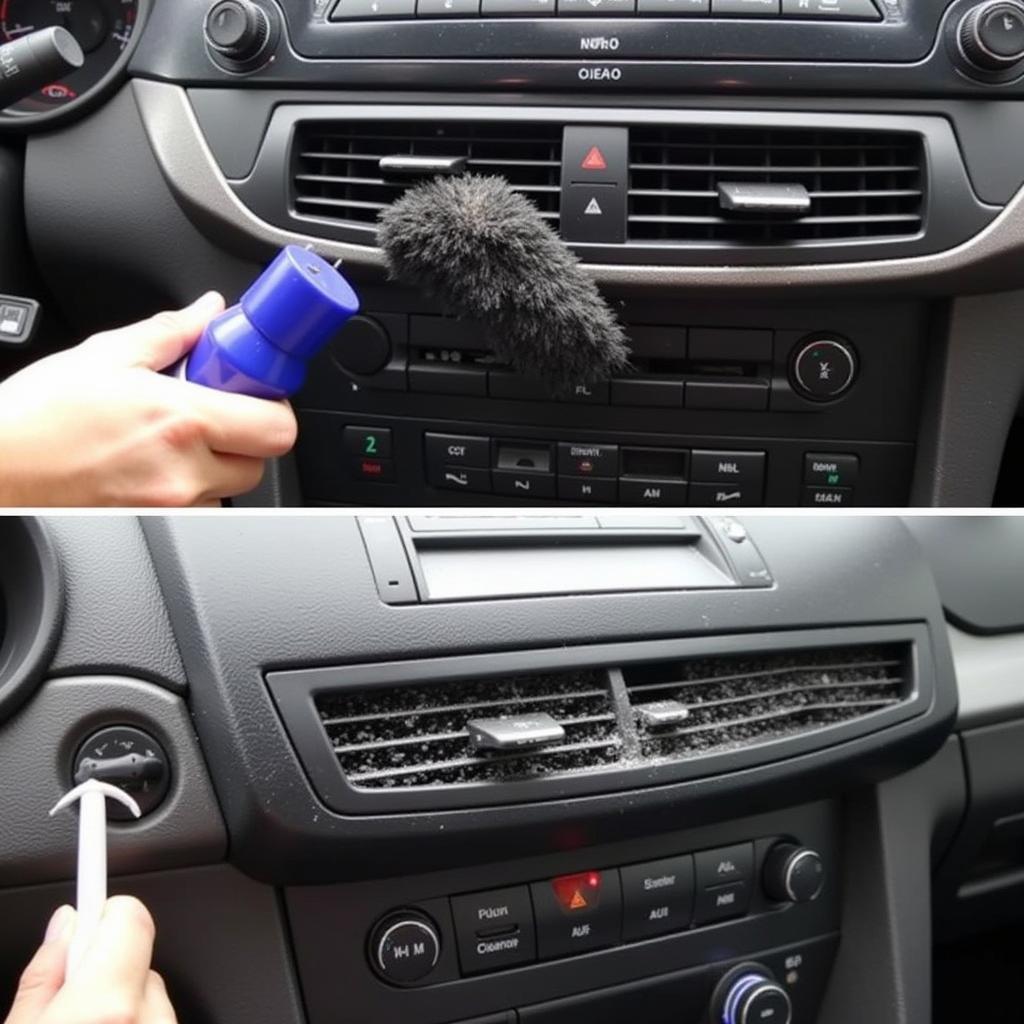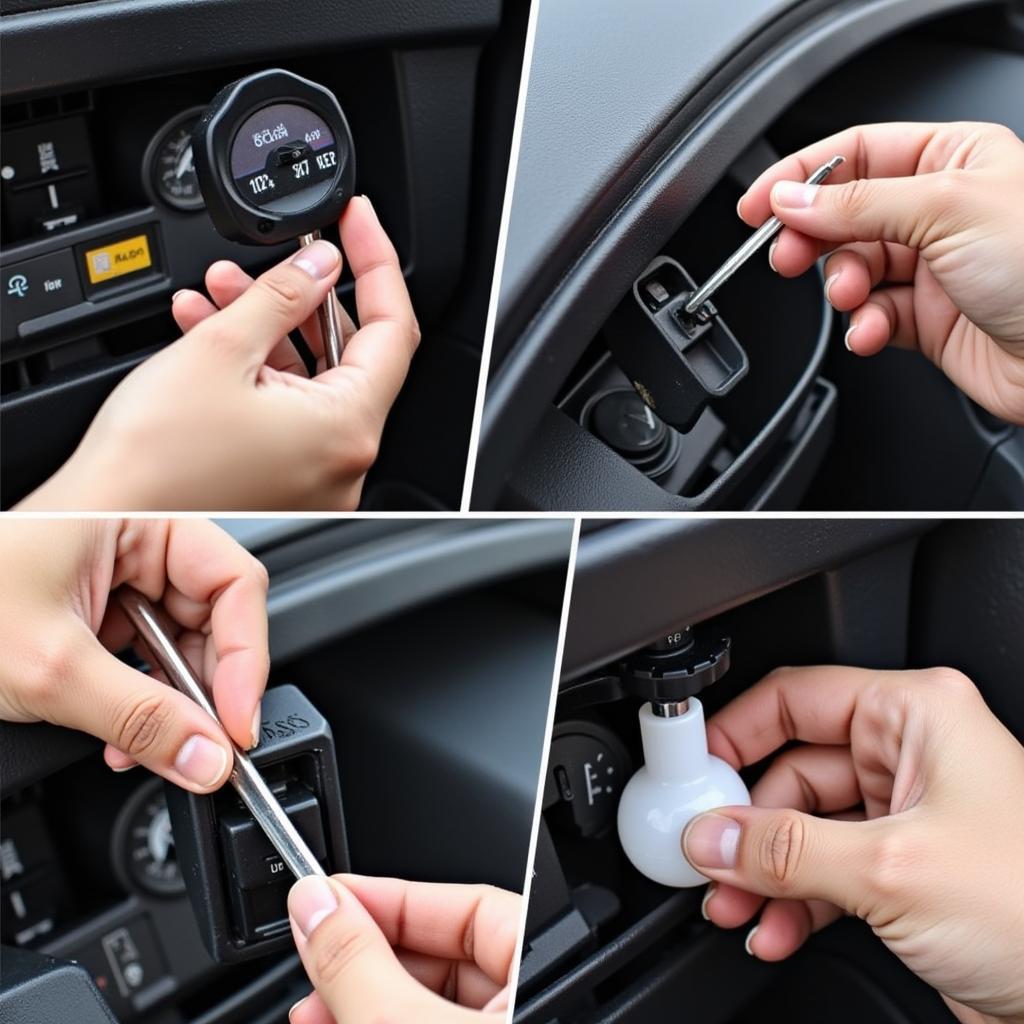Keeping your car’s AC system in top shape is essential for a comfortable and enjoyable driving experience, especially during hot summer months. Whether you’re a car owner, a mechanic, or an automotive technician, understanding proper AC maintenance is crucial for preventing costly repairs and ensuring optimal performance.
This guide will delve into the essential aspects of car AC maintenance, providing practical tips and insights to help you maintain your system’s efficiency and longevity. We’ll explore various topics, from regular inspections and cleaning to identifying common issues and troubleshooting solutions. By following these guidelines, you can keep your car’s AC running cool and smoothly for years to come.
Why is Car AC Maintenance Important?
Ignoring your car’s AC system can lead to various problems, impacting both your comfort and safety. Here are some reasons why regular maintenance is vital:
- Improved Performance: A well-maintained AC system delivers optimal cooling performance, keeping your car’s interior comfortably cool even on the hottest days.
- Increased Efficiency: Regular servicing helps prevent refrigerant leaks, ensuring your AC runs efficiently and doesn’t consume excessive fuel.
- Longer Lifespan: Proactive maintenance can extend the lifespan of your AC system by catching and addressing minor issues before they escalate into major problems.
- Safety: A properly functioning AC system can contribute to driver alertness, particularly during long drives in hot weather.
- Reduced Repairs Costs: Addressing minor issues early on can prevent them from becoming costly repairs later.
Car AC Maintenance Checklist: A Step-by-Step Guide
To ensure your car’s AC system operates effectively, it’s essential to adhere to a regular maintenance schedule. Here’s a checklist to help you keep track:
1. Regular Inspections:
- Visual Inspection: Check for any visible signs of damage, leaks, or wear and tear on the AC components, including the condenser, evaporator, hoses, and belts.
- Refrigerant Levels: Ensure the refrigerant levels are adequate. Low refrigerant levels can reduce cooling performance and lead to system damage.
- Filter Check: Inspect the cabin air filter, which filters out dust and other pollutants, for signs of clogging. A dirty filter can restrict airflow and reduce cooling efficiency.
2. Cleaning:
- Condenser Cleaning: The condenser, located at the front of the vehicle, can become clogged with debris, impacting cooling efficiency. Clean the condenser with a gentle stream of water to remove dirt and leaves.
- Evaporator Cleaning: The evaporator, located inside the car’s dashboard, can accumulate dust and grime, reducing airflow and cooling capacity. Professional cleaning is usually recommended.
3. System Recharge:
- Refrigerant Recharge: Over time, refrigerant levels can decrease due to leaks or normal wear and tear. A professional technician should recharge the system with the correct refrigerant type.
4. Belt Inspection:
- Belt Condition: The serpentine belt powers various components, including the AC compressor. Inspect the belt for cracks, fraying, or excessive wear and tear. Replace it if necessary.
5. Compressor Check:
- Compressor Operation: The AC compressor is the heart of the system, responsible for circulating refrigerant. Listen for any unusual noises or rattling sounds coming from the compressor, which could indicate a problem.
Common Car AC Problems and Troubleshooting Tips:
Even with regular maintenance, AC problems can arise. Here are some common issues and troubleshooting steps:
1. Weak or No Cooling:
- Low Refrigerant: If your AC is blowing warm air, low refrigerant is a likely cause. Have the system inspected and recharged if needed.
- Clogged Condenser: A clogged condenser can restrict airflow and hinder cooling efficiency. Clean the condenser thoroughly.
- Faulty Compressor: A malfunctioning compressor can prevent the refrigerant from circulating properly. Have the compressor inspected and repaired or replaced as needed.
2. Unusual Noises:
- Compressor Noise: A rattling or grinding sound from the compressor could indicate a failing clutch or internal issues. Have the compressor inspected and addressed promptly.
- Belt Noise: A squealing or chirping noise from the serpentine belt might signify slippage or wear and tear. Inspect the belt and replace it if necessary.
3. Leaks:
- Refrigerant Leaks: Refrigerant leaks can cause reduced cooling performance and damage to the system. Have the system inspected for leaks and repaired promptly.
- Hose Leaks: Inspect the AC hoses for any visible leaks or signs of damage. Replace any faulty hoses.
Pro Tips for Maintaining Your Car AC:
- Regular Service: Schedule regular AC inspections and servicing, typically every 2 years or 30,000 miles.
- Park in Shade: Parking in shaded areas can help reduce the heat load on the AC system and improve its performance.
- Cabin Air Filter: Replace the cabin air filter regularly, following the manufacturer’s recommendations.
- Avoid Excessive Airflow: Setting the AC to the highest airflow setting can strain the system and increase energy consumption. Opt for a more moderate airflow setting.
- Don’t Overfill the Car: A packed car increases the heat load on the AC system, making it harder to cool.
- Use Recirculation Mode: While driving in heavy traffic or hot conditions, use the recirculation mode to reduce heat intake and improve cooling.
- Inspect the Blower Motor: The blower motor is responsible for circulating air within the cabin. Make sure it’s working properly.
Expert Insights on Car AC Maintenance:
“Regularly inspecting your car’s AC system is crucial for maintaining its performance and longevity. Paying attention to small details and addressing any unusual noises or symptoms early on can prevent costly repairs down the line,” says John Smith, a seasoned automotive technician with over 20 years of experience.
“Don’t hesitate to consult with a qualified mechanic if you notice any issues with your AC system. Proper diagnosis and repair can ensure your car’s AC continues to provide you with a comfortable and enjoyable ride,” adds Mary Jones, a renowned automotive specialist.
Conclusion:
Maintaining your car’s AC system is essential for ensuring optimal performance and a comfortable driving experience. By following this comprehensive guide and incorporating these proactive tips, you can keep your AC running smoothly and efficiently. Remember, regular inspections, cleaning, and professional servicing are key to preventing costly repairs and extending the lifespan of your AC system.
Don’t wait until your AC starts blowing warm air to address potential issues. Contact us at Autotippro for any assistance or questions regarding your car’s AC maintenance.
- Phone: +1 (641) 206-8880
- Office: 500 N St Mary’s St, San Antonio, TX 78205, United States
FAQ:
Q: How often should I get my car’s AC serviced?
A: It’s generally recommended to have your car’s AC system serviced every 2 years or 30,000 miles.
Q: What are the signs of a failing car AC system?
A: Signs include weak or no cooling, unusual noises, refrigerant leaks, and a decrease in the AC’s blowing force.
Q: What should I do if my AC is blowing warm air?
A: Check for low refrigerant levels, a clogged condenser, or a faulty compressor. Have the system inspected by a qualified mechanic.
Q: Can I recharge my car’s AC system myself?
A: It’s not recommended to recharge your AC system yourself unless you have the proper tools and expertise. It’s best to consult a qualified mechanic.
Q: How do I prevent refrigerant leaks?
A: Regular inspections, proper handling during servicing, and addressing any leaks promptly can help prevent refrigerant leaks.
Q: How can I extend the lifespan of my car’s AC system?
A: Regular maintenance, driving with windows closed during hot weather, and avoiding excessive airflow settings can help extend the system’s lifespan.






Leave a Reply